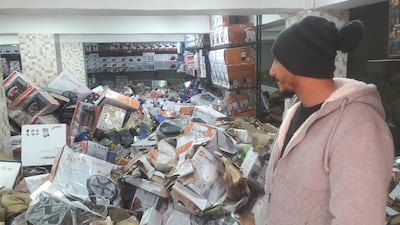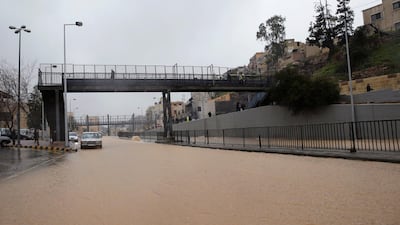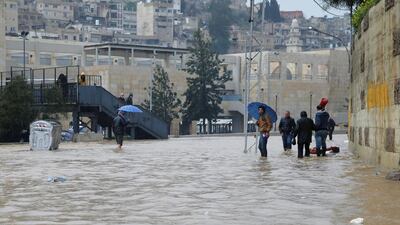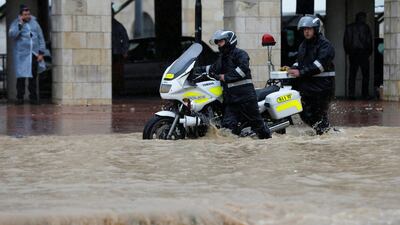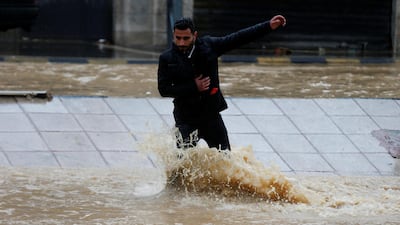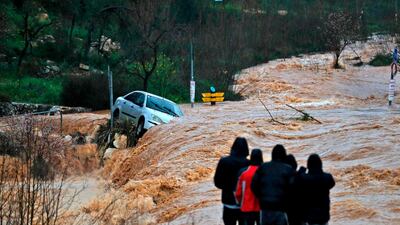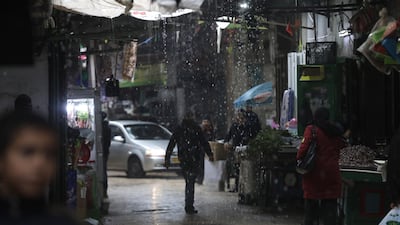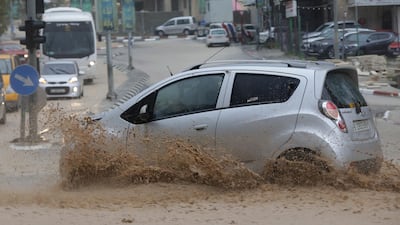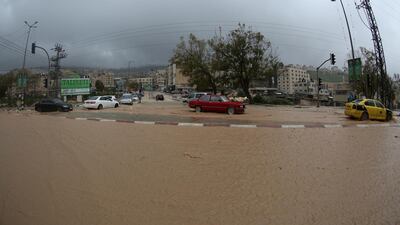Life slowly returned to normal on Sunday in downtown Amman – the Jordanian capital which was hit the hardest by a weekend of torrential rains and floods.
Dozens of shop owners and importers in the city's economic heart were clearing out premises, now piled high with wet boxes, mildewed fabric and broken electronics.
Despite all efforts to return to business as usual, the area – lined with tourist sites and shops – was still visibly reeling from the damage caused by three-metre-high floods on Thursday.
For business owners in the downtown area already struggling with Jordan's sluggish economy the heavy flooding brought added hardship.
At Orbit Stars Electrical importer and wholesaler in Souk Al Jumleh, owner Ali Saad’s sons on Sunday were rifling through mounds of mud-caked electric fans, blenders, heaters and overturned filing cabinets.
The floods have cost them JD100,000 (Dh518,000) in inventory, in addition to the JD60,000 they had paid in customs fees and taxes to clear their imported goods. For a family business employing six brothers and their six sons, they describe the floods as a "catastrophe."
"Our entire extended family and their immediate families all depend on this business," said Yousef Ali Saad, 27, as he picked up a soaking-wet surround-sound stereo speaker – a set which cost JD100 to import and of which dozens were lying around. "This is the lifeline for dozens of men, women and children."
Yousef closed up the warehouse and storefront on Thursday afternoon, leaving just three minutes before the floods hit. The decision likely saved his life.
"We count our blessings," said Ali Saad, the owner, who cut a business trip in China short to rush to Amman on Saturday. "But between the refugees, neighbouring wars, and now the floods – it is like we go from one crisis to the next in Jordan."
The Amman Chamber of Commerce called on the government to quickly compensate the owners of 60 shops and companies for over JD2 million in losses claiming that a lack of preparedness and poor infrastructure failed to divert the rainwater which submerged the downtown valley.
Shop owners expect little due to precedent. Officials had promised compensation after a less-devastating flood hit these storefronts in 2015. Not a dinar materialised, they say.
Some say that if they cannot recoup some of their losses, they will shutter for good.
“The market was already dead, and we already were suffering from a lack of customers,” said Ahmed Ali, who after suffering six months of losses before the floods, is now considering closing his electronics store in downtown Amman. “Very few people in Jordan have the money to make a purchase, and we can no longer afford to stay open.”
In response to the damage, Jordanian citizens launched a social media campaign and hashtag "yalla, let's go downtown", encouraging Jordanians and visitors to purchase from the struggling businesses.
The Greater Amman Municipality said it will waive affected shop owners from license and municipal cleaning fees, around JD150 annually, for a two-year period to lessen their economic burden.
Meanwhile, Amman's Roman Theatre reopened to visitors late on Saturday after pumping out thousands of gallons of water.
The downpour brought 34 million cubic metres of rainfall to Jordan's dams, which the kingdom relies on for the bulk of its water needs, placing them at an average 50 per cent capacity, and three dams overfull, the ministry of water and irrigation said in a statement.
Jordan has received a 110 per cent increase in rainfall compared to the same period between 2017 and 2018.
The sudden, heavy rains this winter created torrential, fast-moving floods on a scale previously unseen, including a flash-flood that killed 21 people, mainly school students, near the Dead Sea in November.
According to previous civil defence statements, 28 citizens have drowned in rain-induced floods across the kingdom in the last four months.
